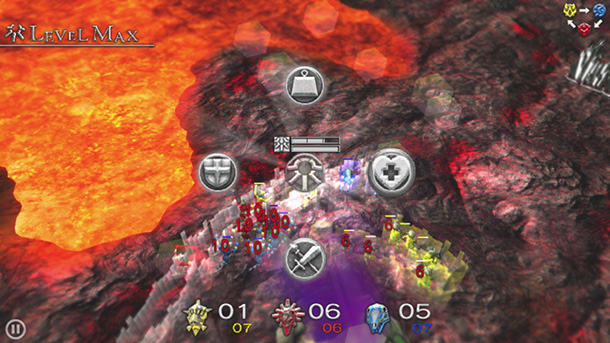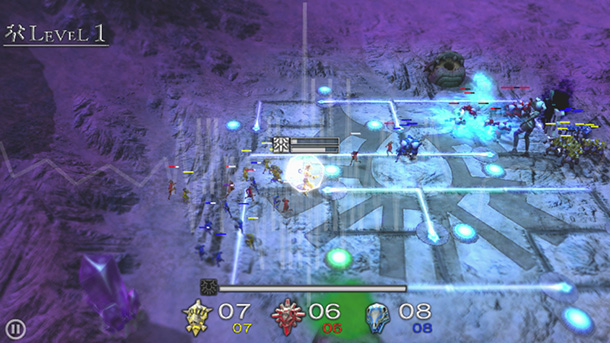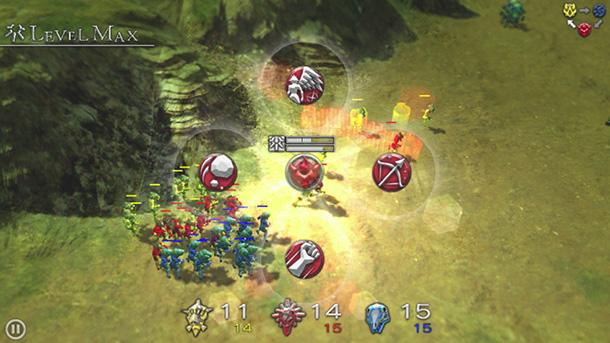The Playstation Vita has become a great dedicated portable device for indie games. The indie games for the Vita seem to utilize the device’s technology much more creatively than triple-A releases. With innovative software like Sound Shapes and Mutant Blobs Attack, I’ve found it’s consistently a home for fresh experiences in both new and classic genres. For one, indie devs aren’t necessarily tied to giant existing franchises and expanding markets; they often create games out of passion and fun, relying less on marketing and more on uniqueness. In fact I almost exclusively purchase smaller, independent games for the handheld, much more often than I even consider bigger retail purchases.
Orgarhythm, developed by Neilo and Acquire, follows the trend of innovative independent games using gaming hardware creatively. It brings along a genuinely interesting mashup of genres that utilizes the Vita’s touchscreen and audio capabilities and opens the door for a potentially exciting, fun musical experience.
Unfortunately, it doesn’t quite hit the right notes to execute it.

Orgarhythm combines the tap-tap-tapping of Patapon with the unit management of Pikmin into a rhythm strategy concept. It asks us, as the game’s musically-inclined God, to control our followers by tapping task management icons to the beat of the soundtrack. These tasks include short- and long-ranged attacks, healing and defense, and are set between three colors (red, yellow and blue) in a paper-rock-scissors balancing act. As the God dances from point A to point B, the followers are sent out to take on enemies of an opposing color or provide a defense to the easily injured deity. Each level is a short sprint through an environment towards the goal of defeating a boss demon, receiving a rank score, and moving on to the next.
It’s a very simple idea, and easy to get a hold of. The controls are straightforward and clean, and the screen is devoid of any kind of clutter to allow the tapping in rhythm to proceed. Beyond this is where the game ultimately falls apart.
For most of Orgarhythm, it becomes easy to feel trapped between discerning if I am meant to be the God or the followers. The God blindly walks toward the goal, relegated to being an item that I need to protect from harm. The followers take on the work of defeating enemies or defending, but without the God’s input they become cliff-diving lemmings. Even when sent out to attack, the targets will often walk right past the target without injury.

It’s odd that a rhythm-based game like this actually moves so slowly. The pacing is frustrating, as the God barely walks at a snail’s pace across the map. The levels are extremely small, and unlike other rhythm games it becomes a chore to replay them whenever I fail. It’s lacking any kind of exploration or choice, other than which enemy to attack first, and even those are pretty much pre-determined based on how many enemies are flanking from one side or another.
The visuals hamper the situation further. Your followers are tiny and difficult to tell apart from enemies; the muddy environment design is repetitive and uninspiring; and the inability to zoom in or out means that units tend to get left behind. The boss battles are really the only thing worth looking forward to in each level, as they at least offer some interesting character design. The game would be better served with a more playful visual style, with bigger sprites and more variety in the environments.
At its core, Orgarhythm is an interesting idea. It comes off a little like “Patapon Pikmin”, but mixes rhythm and strategy effectively into something that only an adventurous indie developer would try. It’s fairly simple to pick up and understand. However, it’s the design choices that cause the game to suffer. From poor visual layout to lackluster AI, it’s not going to maintain our mindshare for very long.
Orgarhythm has a good base from which to build on, and I hope to one day see an update or sequel that tackles those design choices in a better way. It’s certainly unique and it works, but it needed more time put towards actually making it enjoyable enough to recommend.
This review is based on a review code of the game for the Playstation Vita sent to SideQuesting by the publisher.



No Comments